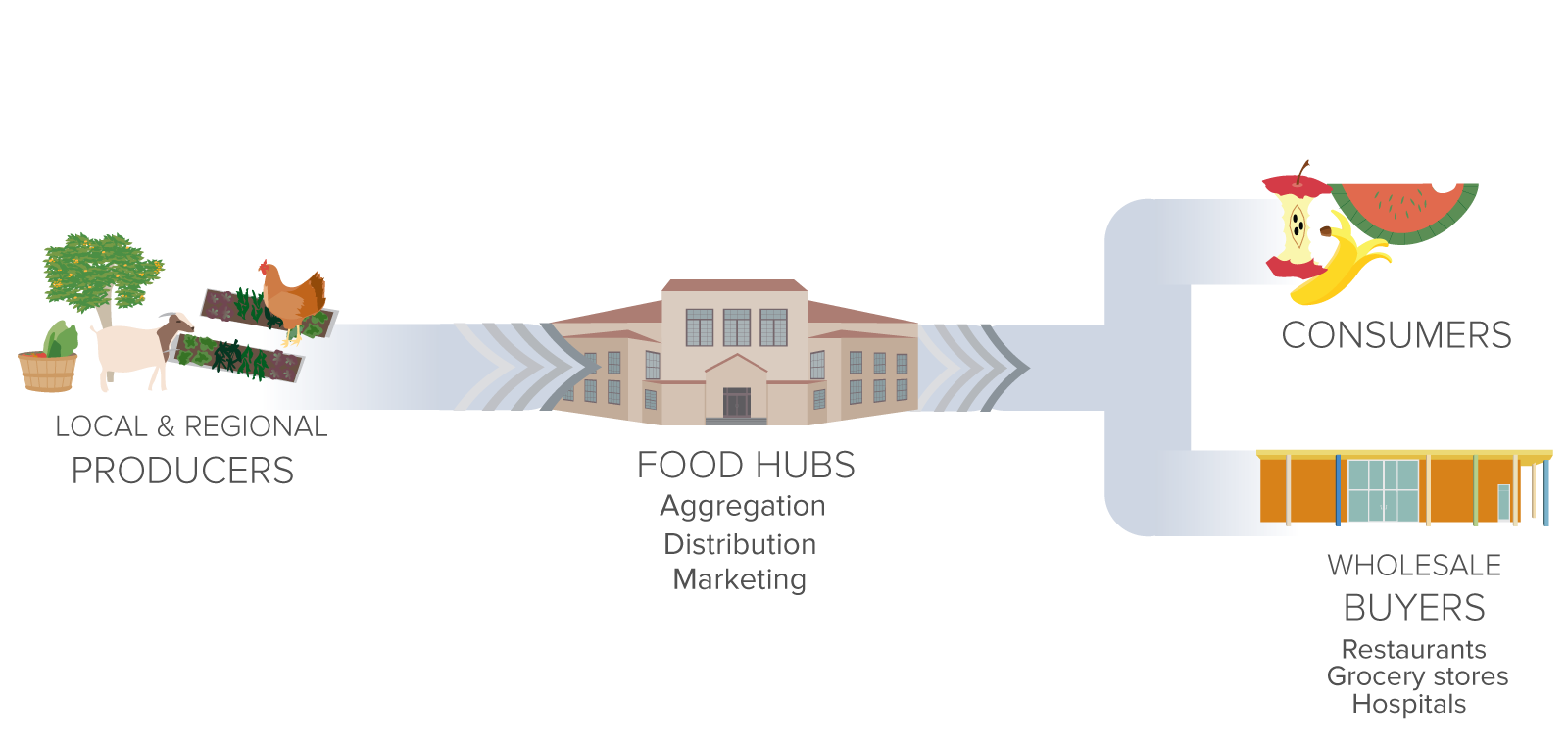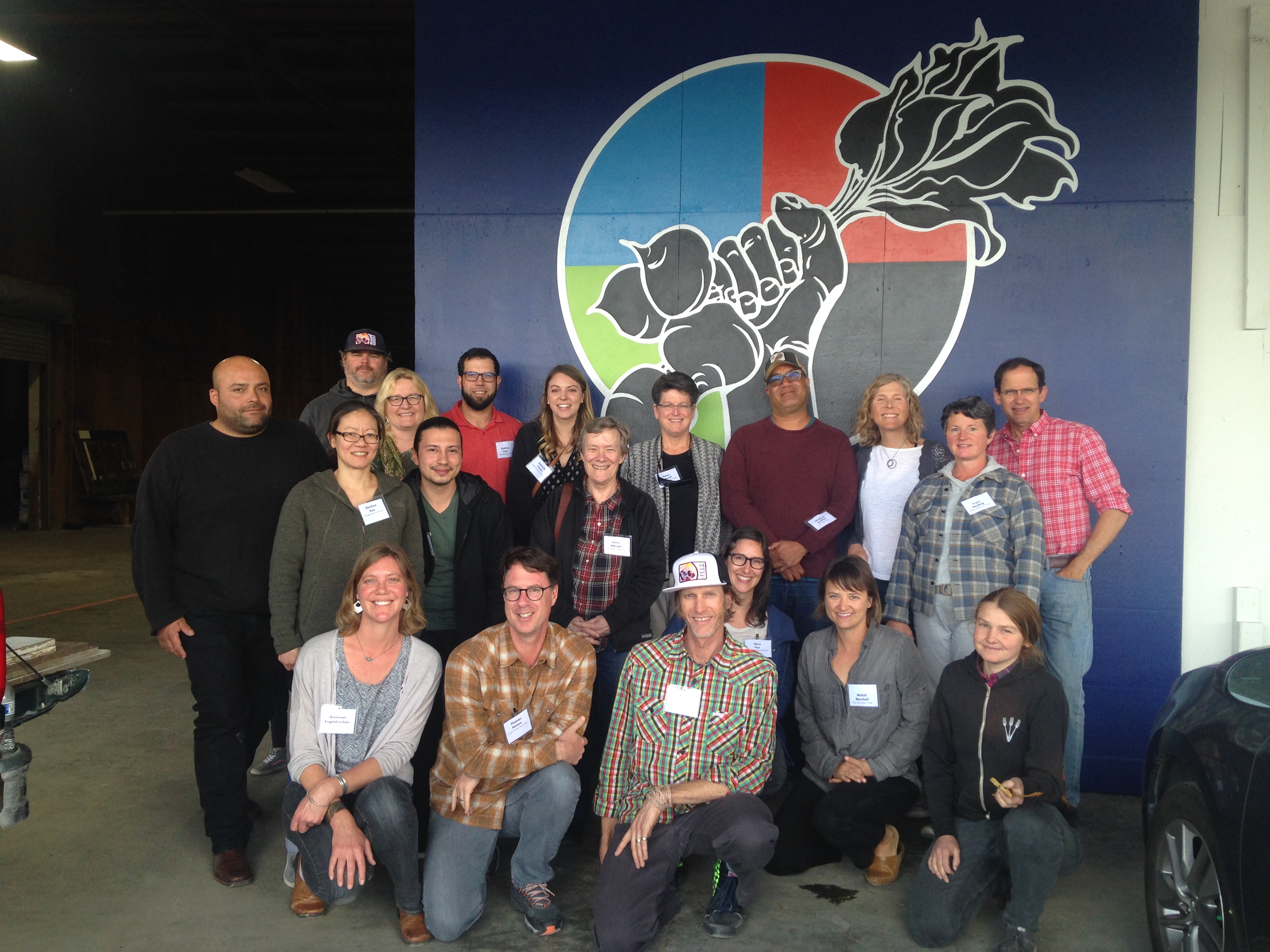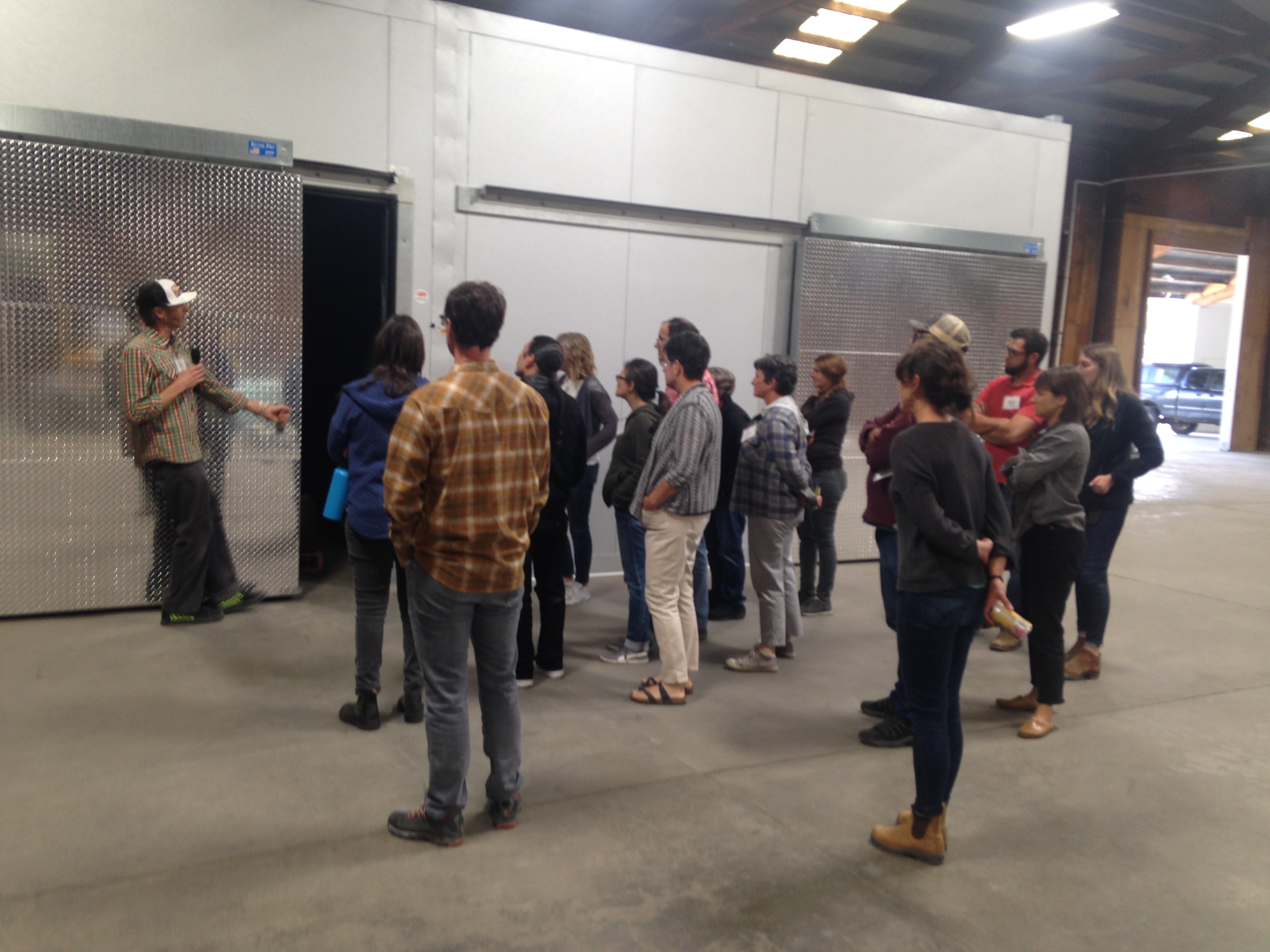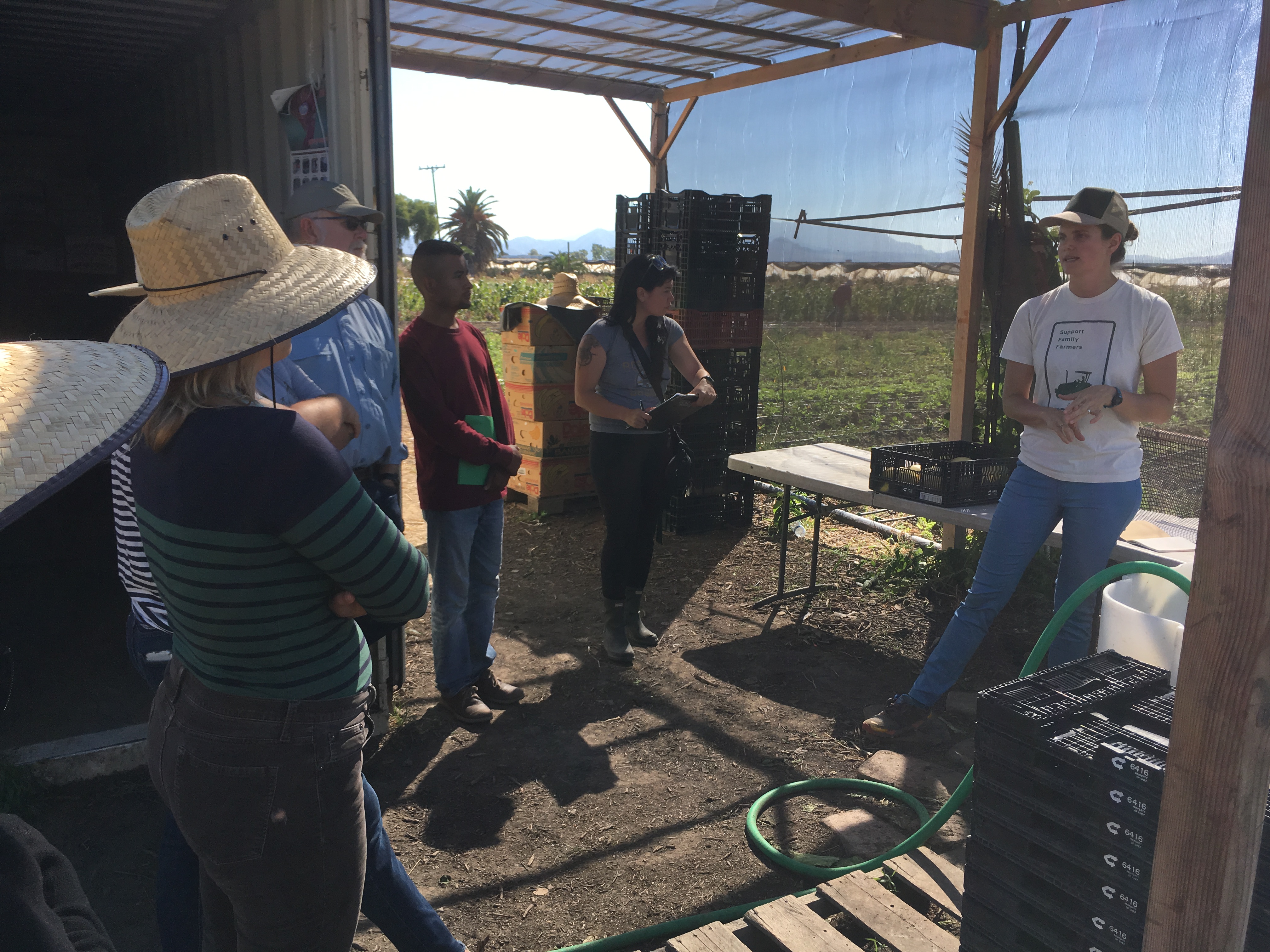Food Hubs & Values-Based Supply Chains
In the last decade, food hubs have firmly established their significance within the landscape of regional food systems. Defined by the USDA as “a business or organization that actively manages the aggregation, distribution, and marketing of source-identified food products primarily from local and regional producers to strengthen their ability to satisfy wholesale, retail, and institutional demand”1 , food hubs are important sales channels for many small to medium-scale farmers, offering transportation efficiency and greater access to markets.

California Food Hub Network
In 2015, UC SAREP launched the California Food Hub Network, a learning network to coordinate technical assistance, collaborative learning and information sharing for and among food hubs in California. Activities include in person convenings, networking events between food hubs and potential buyers, food hub tours, and technical assistance on a diverse range of topics related to food hub operations.



Why a food hub network?
As values-based aggregators/distributors, food hubs face unique business and operational challenges within a highly competitive sales space.
Over the past several years, regional alliances or networks among food hubs have emerged across the U.S. to address shared challenges or develop mutually beneficial opportunities. These networks range from formal alliances characterized by transactional relationships or equipment sharing to informal, learning networks centered around technical assistance and information sharing.
In its present iteration, the CA Food Hub Network exists on the informal end of the spectrum. Our activities are informed by a spirit of collaboration and advancing the shared goal of a sustainable food system in California.
Significance of Food Hubs in Regional Food Systems
Food hubs are uniquely positioned to bridge the gap between farms in the local marketplace, which tend to be smaller with less product volume and less logistical capacity, and institutions, which require greater product volume, consistency and delivery capabilities. According to the USDA’s Regional Food Hub Resource Guide, “food hubs are key mechanisms for creating large, consistent, reliable supplies of mostly locally or regionally produced foods” offering transportation efficiency and greater access to wholesale markets.1
Over the past decade, the number of food hubs in the United States has been on the rise. Between 2007 and 2014, regional food hubs grew in number by 288%2 . In 2017, there were nearly 400 food hubs identified in the United States3 . The 2017 National Food Hub Survey found that food hubs result in local jobs, create linkages between businesses and provide a stable sales channel for beginning, small and mid-size farmers4 .
According to outreach conducted by UC SAREP, in 2017 California was home to approximately 20 food hubs, ranging in size, geographic scope, and type of business model. While some of these hubs are quite small, with gross annual sales under $500,000, on average food hubs in California reported increasing sales, indicating a positive growth trend.5
Other Resources for Food Hubs
Resources from UC SAREP
In this panel discussion and Q&A from June 18, 2024, representatives from three food hubs and one food hub network discuss how their food hubs engage in buying and selling with other food hubs, covering topics including transportation, logistics, pricing, and scaling their operations.
An Annotated Bibliography of Publications and Resources on Food Hubs and Values-Based Supply Chains
A literature review synthesizing recent reports, analyses, and how-to manuals and practical case studies geared towards practitioners developing food hubs, values-based supply chains and similar marketing channels.
A Review of Scholarly Literature on Values-Based Supply Chains
A synthesis of existing research and scholarship on values-based supply chains in the United States.
Food Hubs and Values Based Supply Chains: A Toolkit for California Farmers and Ranchers
This report describes the variety of new values-based supply chains and food hubs in California and helps farmers and ranchers better understand the benefits and constraints of these new marketing opportunities so they can decide if and how they should participate. We provide an overview of benefits and considerations for producers participating in different types of enterprises. We also suggest some questions a producer might want to ask before participating in a particular enterprise. We hope that this effort will shed some light on the growing world of values-based supply chain enterprises so that farmers, ranchers, and consumers can all benefit.
Summary and Key Findings
This document summarizes key findings from our values-based supply chain case studies. This project examines the financial, government regulations, industry business practices and entrepreneurial factors that influence the development of emerging distribution networks embedded in values-based supply chains.
Full Study
This project examines the financial, policy and entrepreneurial factors that influence the development of emerging distribution networks embedded in food-based value chains. Such networks can enhance the sustainability of small- and medium-scale producers, in the broadest sense, by addressing their environmental, economic and social concerns through a focus on cooperation, to gain economies of scale in marketing services, efficiencies in common distribution activities and building food system communities.
An Annotated Bibliography of Publications and Resources on Food Hubs and Values-Based Supply Chains
With the generous support from USDA Rural Development, SAREP has compiled an extensive annotated bibliography on food hubs and values-based supply chains. The bibliography includes academic literature, reports and publications from non-profits and research firms, and articles in USDA publications and trade journals. This resource is part of an ongoing SAREP project, also funded by USDA Rural Development, to provide tools and resources to California farmers and ranchers on this new and emerging field of values-based aggregation and distribution.
Lessons Learned from a California Food Hub Network Pilot
Final report from a UC-funded project to convene a learning network for California food hubs.
Resources from other sources
- National Food Hub Surveys from Michigan State University Center for Regional Food Systems (2015-2021)
- National list-serve facilitated by The Wallace Center: food hub community of practice
- Delivering More Than Food: Understanding and Operationalizing Racial Equity in Food Hubs (2020)
- A Manager's Guide to Food Hub Finances - How to Evaluate and Improve Your Food Hub Operations (2017)
- USDA Regional Food Hub Resource Guide: Food hub impacts on regional food systems, and the resources available to support their growth and development (2012)
- USDA Running a Food Hub: Lessons Learned from the Field (2015)
- USDA Running a Food Hub: A Business Operations Guide (2015)
- USDA Running a Food Hub: Assessing Financial Viability (2016)
- USDA Running a Food Hub: Learning from Food Hub Closures (2017)
- Wholesome Wave Food Hub Business Assessment Toolkit (2014)
- 1Barham, James, Debra Tropp, Kathleen Enterline, Jeff Farbman, John Fisk, and Stacia Kiraly. Regional Food Hub Resource Guide. U.S. Dept. of Agriculture, Agricultural Marketing Service. Washington, DC. April 2012. <http://dx.doi.org/10.9752/MS046.04-2012>
- 1Barham, James et al. 2012 Regional Food Hub Resource Guide. U.S. Dept. of Agriculture, Agricultural Marketing Service. Washington, DC.
- 2Low, Sarah A. et al. 2015. Trends in U.S. Local and Regional Food Systems, AP-068, U.S. Department of Agriculture, Economic Research Service.
- 3Colasanti, K. et al. 2018. Findings of the 2017 National Food Hub Survey. Michigan State University Center for Regional Food Systems & The Wallace Center at Winrock International.
- 4Ibid.
- 5UC SAREP California food hub survey. 2018. Unpublished.
